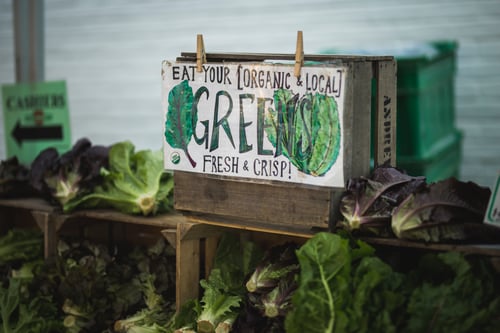 These days, you see the word "organic" used just about everywhere, be it on food, a T-shirt, or even your soap! But what does it mean to call something organic?
These days, you see the word "organic" used just about everywhere, be it on food, a T-shirt, or even your soap! But what does it mean to call something organic?
Whether you’re growing cotton or chickpeas, certified organic produce requires you to adhere to a particular set of guidelines set by the Department of Agriculture of the United States (USDA). Overall, organic farmers need to show that they are taking stringent steps to conserve natural resources and maintain biodiversity.
Key organic practices
1. Maintaining organic soil
Organic farmers work to preserve soil health by using manure or compost and other organic matter instead of synthetic fertilizers. They must also avoid pesticides, antibiotics, growth hormones, and petroleum or sewage/sludge-based fertilizers. And this process isn't instant - the soil must be free of these synthetic substances for three years before it can be considered an organic harvest.
Biological fertilizers such as compost improve soil health in the following ways:
- they slowly release nutrients
- they build up organic soil matter
- they increase the soil's moisture-retaining ability
- they reduce the chances of nitrates leaching into groundwater.
Although biological fertilizers are the rule, there are a very limited number of synthetic fertilizers that may be permitted for organic farming. If a farmer must use one of these, the substance itself must first be part of the list approved by the USDA. Farmers are also only allowed to use them after trying everything else and only in minimal amounts.
2. Practicing crop rotation
Crop rotation refers to planting a variety of crops on a given piece of land over time. The sequence of crops to be grown is carefully engineered to ensure soil nutrient sustainability, the management of insect populations, the destruction of weeds, and optimal soil health.
Instead of planting the same crop from January to December and then restoring soil health with fertilizers, pesticides, and herbicides, the core concept of crop rotation is to give the crops themselves the responsibility of sustaining soil health.
Understanding what each crop contributes and takes from the soil is essential to ensuring a good crop rotation. Nitrogen depleting crops should, for instance, be followed by nitrogen-fixing crops such as lentils.
3. Avoiding GMOs
Genetic modification or genetically modified organisms (GMOs) are prohibited with organic farming. That means an organic farmer can't grow GMO seeds, an organic cow can't consume GMO maize, and that an organic soup maker can't use any GMO products. Farmers must demonstrate that they do not use GMOs to comply with USDA organic regulations.
Organic foods are regulated by the USDA
Through its National Organic Program (NOP), the United States Department of Agriculture (USDA) controls organic production, assuring customers that USDA-approved organic products follow the same requirements across the board.
How do they do this? A certifier visits the farm where the food is grown to ensure that the farmer follows all the regulations required to meet USDA organic requirements before the product can be branded organic. Even after the farmer passes the standards set, they can’t rest on their laurels. Following certification, organic farmers are expected to establish an organic farm operating plan, which the USDA supervises through regular third-party inspections.
Understanding the hoops that organic farmers like Timeless gladly jump through will help you make more informed choices about the food you buy. When we say ‘organic’, you can rest assured that we follow only the strictest organic standards at all stages of the process, from our farm to your fork.